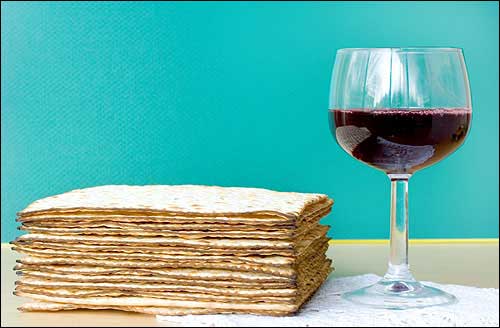Passover marks season of renewal
For Christians, springtime is always linked to Easter and the celebration of the Resurrection of Jesus Christ.
But for Jews, the religious holiday associated with this season of rebirth is Passover.
Jews have been celebrating the spring festival of Passover for more than 3,000 years, eating symbolic foods, singing traditional songs and saying Hebrew blessings to commemorate the Exodus of the Israelites from slavery in Egypt to freedom.
Millions of Jews around the world, as well as many Jews in Lawrence, will gather with family and friends around the dinner table today and Sunday to celebrate Passover Seders. They are special meals designed to retell the ancient story of a hard-hearted Egyptian pharaoh, Moses and the Jewish people’s overcoming of hundreds of years of oppression.
Passover, an eight-day holiday, begins at sunset today and concludes at sunset May 1. Most Jews observe the festival by having one or two Passover Seders at the holiday’s outset.
The week of Passover is also a time when many observant Jews abstain from eating bread or any food that contains a leavening agent, called “chametz” in Hebrew.
Instead, Jews eat matzah, which, unleavened and cracker-like, is called the bread of oppression.
“If Jews do nothing else (religiously), they’ll attend a Passover Seder during the year. It’s a good point of entry for anybody who’s Jewish to connect with other Jews,” says Polli Kenn, program director at Kansas University Hillel, 904 Miss.
“Most (Jews) do something, even if it’s just to eat matzah and attend a Passover Seder on the first or second night. They also may or may not keep kosher during Passover; we do have students who try.”

Unleavened bread and wine are important elements in the celebration of Passover, the Jewish holiday commemorating the Exodus from Egypt.
There are about 1,800 Jewish students at KU, according to Kenn.
Seder is a Hebrew word that means “order,” in the sense of blessings, songs and rituals that take place in a certain order and retell the Passover story.
Participants use a Haggadah during the Passover meal. Haggadah, a Hebrew word that means “telling,” is a special prayer book of blessings, songs and the story of how Moses came to lead the Jewish people to freedom.
“I think the appeal of Passover is that it’s a time where Jews reaffirm ourselves as a people every year, where we’ve been and where we are now,” Kenn says.
“It’s really a time where we see our families and friends. And what’s better than a big, festive meal with family and friends?”
Emily Caulfield, 20, a KU sophomore from Sugar Land, Texas, will be varying her Passover observance this year.
“I’m actually going to Minnesota. I have two friends from KU that I met through Hillel, and I’m going home with them for Passover with their families,” she says.
“I didn’t have time to go to Texas. It’s a shorter drive to Minnesota, so I’m going to St. Paul.”
For Caulfield, Passover has typically involved a holiday meal and visiting with relatives.
“To me, it just means remembering and celebrating our freedom from Egypt, and our freedom in general,” she says. “You get to spend a lot of time with immediate and extended family.”
| There will be several events in Lawrence to celebrate Passover, which begins at sundown today and ends at sundown May 1:¢ A second-night Passover Seder will be celebrated at 6 p.m. Sunday at the Lawrence Jewish Community Center, 917 Highland Drive.Cost for meal, which is a full seder, $15 per person. Seats may be reserved in advance by contacting Polli Kenn at pkenn@kuhillel.org. Or those who wish to participate may pay at the door.¢ Kansas University Hillel, 904 Miss., will have a special program, “Massage, Mel Brooks and Matzah Brie,” at 6 p.m. Tuesday. Program, open to KU students, features tips from a massage therapist; watching a Mel Brooks movie; and enjoying matzah brie, a Passover dish. Program, free; dinner, $5 per person.¢ KU Hillel will have a “Chocolate Seder” at 6 p.m. Thursday. Open to KU students.¢ KU Hillel also is offering kosher meals during the week of Passover. Cost per nightly dinner, $5; cost for entire week, $20.For more information, call KU Hillel at 749-5397 or go online to www.kuhillel.org. |

